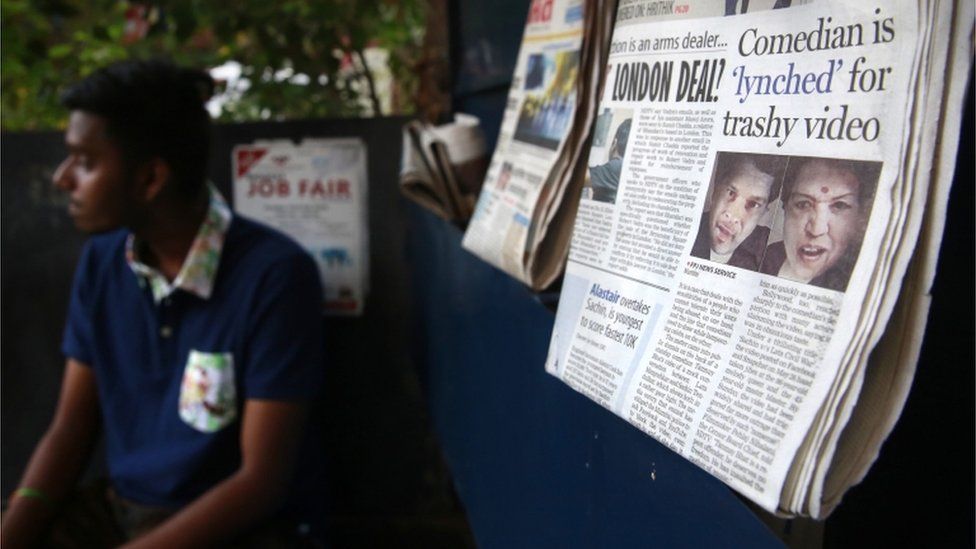Outrage to success: India comedian demonstrates Streisand effect
- Published

Last week, police in the western Indian city of Mumbai asked Facebook and YouTube to remove a video mocking cricket icon Sachin Tendulkar and Bollywood singer Lata Mangeshkar.
They had received complaints from politicians about the video, posted by comedian Tanmay Bhat on Snapchat.
Unlike in the US where it is the second most downloaded app, Snapchat is not popular in India, except among teenagers. As of 1 June, it was only 89th on the Google Play store according to App Annie, a company that ranks apps by downloads.
The offending video would probably have had only a few views, but for the explosive backlash it faced on social media which was then picked up by mainstream media.
Reposted on other platforms, including Facebook and YouTube, and linked to news reports by local and global media, the video ended up getting well over 200,000 views.
This is the latest in a list of examples of the Streisand Effect in India, where an attempt to suppress something has the unintended effect of publicising it more widely.
The phenomenon is named after American entertainer Barbra Streisand, after she sued a photographer and a website for $50m, demanding the removal of an aerial photograph of her home from a collection of 12,000 pictures taken to document coastal erosion.
Only six people had seen the photo before Streisand's failed lawsuit. Over 420,000 people viewed the photo in a single month soon after.
Battleground Amazon
Authors in India such as journalist Rana Ayyub, who recently launched her book Gujarat Files: Anatomy of a Cover Up, are also experiencing this phenomenon.
The book title refers to the 2002 riots when the Gujarat government, under then chief minister Narendra Modi, was accused of having supported violence against Muslims.
Mr Modi's famously thin-skinned supporters went after the book. Even before it was available, 200 negative reviews had been posted on the Amazon page that listed the book, according to the author.
As of 1 June, the page had 1,300 customer reviews of which 70% were strongly negative, with the lowest possible rating of one star. Some of those reviews were identical.
Ms Ayyub said the online attack increased the buzz around the book. "It got picked up by the global media, so it was great for a self-published book that was launched without fanfare. I've had thousands of downloads, and there are 15,000 copies in the market in the first week."
Similarly, television journalist Barkha Dutt's memoirs This Unquiet Land faced the "attack of the trolls" earlier this year. As of 1 June, the Amazon page listing her book had 4,100 reviews, 95% of which were strongly negative with one-star ratings.
Twitter users have known this phenomenon for years.
In 2012, an unknown businessman called Ravi Srinivasan in southern India tweeted that a young politician linked to the then-ruling Congress party had amassed a lot of wealth. The politician filed a complaint, and the police arrested the businessman the next morning.
There was an explosion of support for Mr Srinivasan, who became a hero on prime-time television and other media.
His Twitter following grew from 16 to 2,300 in 48 hours and the tweet, originally seen by a handful of followers, reached hundreds of thousands, via television, newspapers and social media.
When lawsuits backfire
Heavy-handed legal action that aims to suppress information frequently has the reverse effect.
In April 2014, a book called Gas Wars: Crony Capitalism and the Ambanis was self-published by three authors.
Two companies headed by the Ambani brothers, who are among India's richest men, sent four legal notices for defamation to the authors, websites Amazon and Flipkart which had listed the book for sale, and even a publication that had carried a review of the book.
One notice demanded damages of 1bn rupees ($15m; £10.3m).
This legal notice helped catapult a book on the arcane subject of gas pricing into the global media spotlight, with stories in Newsweek and the New York Times, among others.
"The newspapers and television channels had ignored Gas Wars, but the legal notices made news," co-author Paranjoy Guha Thakurta says. "Many rushed out to buy the book before it got banned."
The episode led to another book by two of those authors. Sue The Messenger, also self-published, focused on the "legal harassment by corporates" that shackle reporters and writers.
A more recent case involved a ponytailed, self-styled management guru called Arindam Chaudhuri and his Indian Institute of Planning and Management (IIPM).
The IIPM was the focus of much controversy, which it partly drowned out with enormous spends on large newspaper ads.
Its favourite tool, however, were legal threats against authors and journalists, usually filed from remote parts of India, forcing respondents to travel to those courts.
One such notice got Penguin to remove a chapter on Mr Chaudhuri from a book it had published in 2011.
Not everyone caved in. Maheshwer Peri, whose publication Careers 360 faced over a dozen lawsuits from Mr Chaudhuri and IIPM, fought every one of the cases in courts across the country.
Every new case filed by IIPM brought renewed attention to the three articles published in 2009 that Mr Chaudhuri was trying to suppress, Mr Peri pointed out.
Over the years, Mr Chaudhuri may have finally learnt about the Streisand Effect, but at a high cost.
Last year, after a series of adverse orders in various courts, IIPM announced it was shutting down all its campuses in India.
The Streisand Effect had found its mark again.
- Published30 May 2016